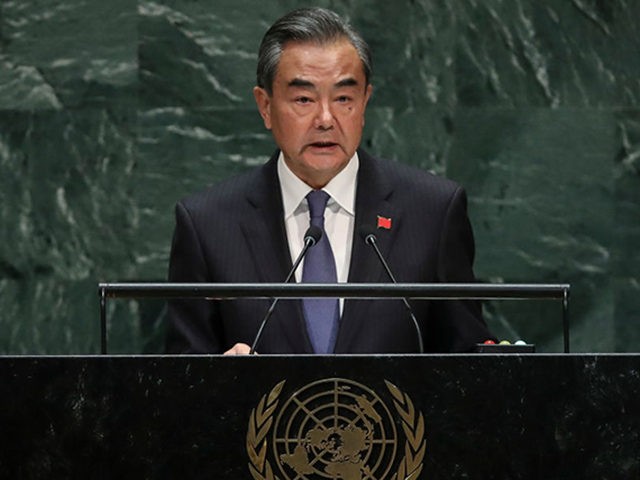Chinese Foreign Minister Wang Yi floated the possibility on Thursday of offering Latin American countries a $1 billion loan to buy a Chinese coronavirus vaccine from Beijing.
Communist Party dictator Xi Jinping vowed during the World Health Assembly in May that a vaccine made by China would be a “global public good” available to all nations, implying that China would donate doses of the vaccine for free. Wang appeared to confirm that China would only make the vaccine universally available to purchase, not as a humanitarian offering.
China has spent much of the past decade convincing underdeveloped nations to take out predatory loans through its “Belt and Road Initiative” (BRI), a global infrastructure plan in which China offers to give loans to these countries then used to pay for Chinese contractors to built ports, railways, and other infrastructure. When the country defaults on the loan, China seizes the property it built, expanding its influence.
Wang reportedly offered the loan at a video conference with Latin American foreign ministers on Thursday, led in tandem with Mexican Foreign Secretary Marcelo Ebrard.
“Facing the global crisis caused by the pandemic and great changes not seen in a century, China’s will to promote strategic and long-term relations with the Community of Latin American and Caribbean States will not change,” Wang said at the conference, according to China’s state-run CGTN. “Its determination to deepen solidarity and cooperation and achieve common development will not change. Its vision of jointly promoting South-South cooperation and improving global governance will not change.”
CGTN added that Wang also promoted something he called the “China-Latin America digital silk road,” a technological analog to the BRI.
CGTN noted only that Wang promoted “increasing vaccine research and development” but did not mention any loans in its written coverage of the event. Similarly, the state-run Xinhua news agency omitted any mention of a loan, instead highlighting Wang’s call to promote “the co-construction of Belt and Road.”
“Participants expressed appreciation to China for promoting international cooperation in the fight against COVID-19 [the Chinese coronavirus], sharing experience in this regard and pledging to make vaccines an international public good once they are successfully developed,” Xinhua claimed.
Non-state media, in contrast, led its coverage with the offering of the loan. The left-wing propaganda outlet Telesur reported that Wang offered “a credit of one billion dollars so that Latin American and Caribbean countries can access the vaccine against [the Chinese coronavirus].” The Argentine news site Infobae also highlighted the loan, offering a quote from the conference from Wang asserting the vaccine “will be a universally accessible public good and we will set aside a loan of $1 billion to support access [to it] to nations in the region [Latin America].”
Wang’s description of the vaccine as “universally accessible” echoed Xi’s assertions at the World Health Assembly, an event hosted by the U.N.’s World Health Organization (W.H.O.).
“[Chinese coronavirus] vaccine development and deployment in China, when available, will be made a global public good,” Xi said at the time. “This will be China’s contribution to ensuring vaccine accessibility and affordability in developing countries.”
Xi notably omitted that the access would come at a price.
Chinese laboratories claim to have been working on a vaccine for months. In June, the People’s Liberation Army (PLA) began injecting soldiers with the experimental vaccine; China has not yet made any findings from the vaccinations available to the public. It is unlikely that any negative results would appear in public.
China’s zeal to rapidly develop a vaccine has led to heightened espionage and attempts at intellectual property theft in the United States, according to multiple senior officials. The FBI and Department of Homeland Security warned of hacking operations presumed to be by Chinese agents to steal coronavirus research in May, according to the Wall Street Journal and New York Times.
“China’s long history of bad behavior in cyberspace is well documented, so it shouldn’t surprise anyone they are going after the critical organizations involved in the nation’s response to the Covid-19 pandemic,” Christopher Krebs, the director of the Cybersecurity and Infrastructure Security Agency, told the New York Times at the time.
“I have little doubt that the Chinese intelligence services are actively trying to steal America’s intellectual property as it relates to the virus that they unleashed on the world, because, of course, they want to be the country that claims credit for finding those drugs or finding a vaccine, and then use it as leverage against the rest of the world,” Sen. Tom Cotton (R-AR) asserted in April. “[T]he Chinese Communist Party has been stealing America’s intellectual property for decades, and they aren’t going to magically stop in the middle of a pandemic.”
China is the origin country of the Chinese coronavirus pandemic; all reports indicate the first identified cases occurred in central Wuhan, the capital of Hubei province.

COMMENTS
Please let us know if you're having issues with commenting.